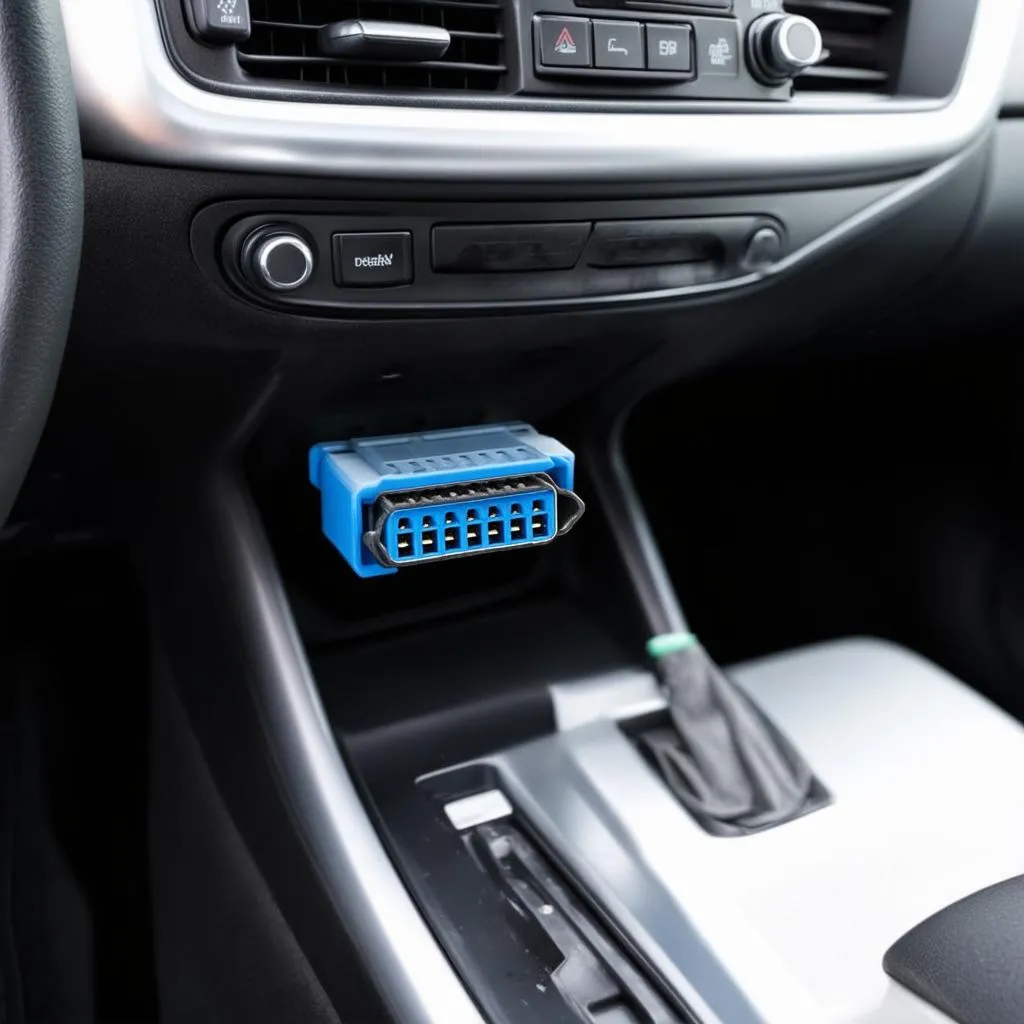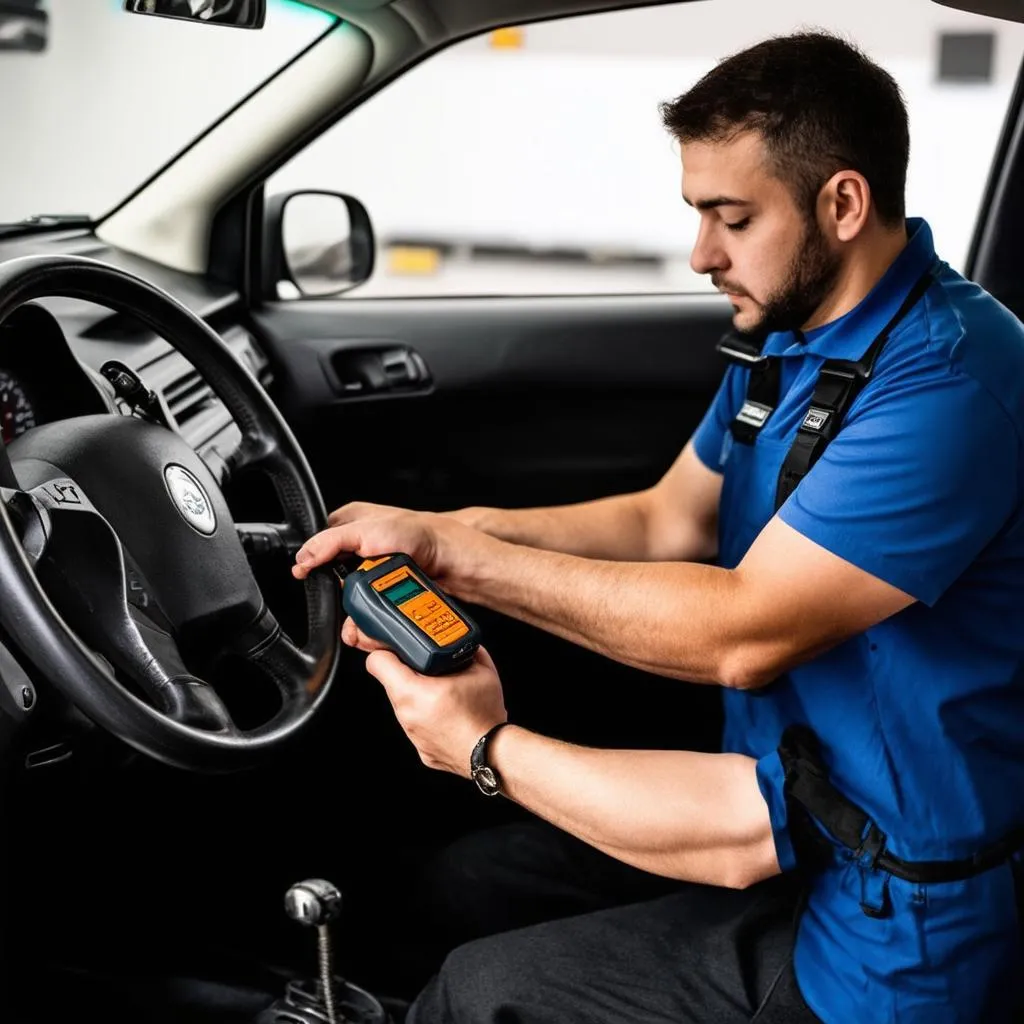Have you ever wondered what that mysterious port tucked away under your dashboard is? It looks like a small, rectangular socket with a bunch of pins, and you might have even seen mechanics plugging a device into it. This, my friends, is the OBD port, short for On-Board Diagnostics. But what exactly is it, and what does it do? Let’s dive in!
The Importance of OBD: A Glimpse into Your Car’s Inner Workings
The OBD port is a gateway to a wealth of information about your car’s health. It’s like a window into the intricate workings of your vehicle’s engine and other vital systems. Imagine it as your car’s personal doctor, constantly monitoring its vitals and providing valuable insights to keep it running smoothly.
Understanding the OBD: A Technical Perspective
The OBD system is a standardized computer-based diagnostic system used in modern vehicles. It’s like a small, onboard computer constantly analyzing various sensors in your car, collecting data about everything from engine performance to emissions levels. This data is then stored in the vehicle’s ECU (Electronic Control Unit).
Think of the ECU as your car’s brain, responsible for interpreting all the data it receives and making decisions about how to regulate the engine’s operation. The OBD system allows mechanics and even car owners to access this data using a special tool called an OBD scanner.
The Power of OBD Scanners: Diagnosing Issues and More
OBD scanners, also known as code readers, are designed to connect to the OBD port and retrieve the diagnostic trouble codes (DTCs) stored in the ECU. These codes are essentially messages from the car’s computer, providing valuable insights into any malfunctions or potential issues.
What Information Does an OBD Scanner Reveal?
An OBD scanner can provide you with a plethora of information about your car, including:
- Engine Performance: Identify issues related to engine misfires, fuel efficiency, and other vital functions.
- Emissions: Detect potential problems with your car’s emissions system, ensuring compliance with environmental regulations.
- Safety Systems: Monitor your car’s safety systems, such as ABS (Anti-lock Braking System), SRS (Supplemental Restraint System), and traction control.
- Vehicle Speed: Access real-time data about your car’s speed, allowing for more efficient driving and fuel management.
- Fuel Consumption: Monitor your fuel consumption, identify potential areas for improvement, and track your car’s overall fuel efficiency.
The OBD’s Role in the Modern Automotive Landscape
The OBD system has revolutionized the way we diagnose and maintain our cars. It’s empowered both mechanics and car owners with a powerful tool to:
- Identify and troubleshoot issues: Early detection of problems can prevent more serious breakdowns and costly repairs.
- Improve vehicle performance: Understanding your car’s data can help you make informed decisions to optimize its performance and fuel efficiency.
- Ensure environmental compliance: Monitoring your emissions system ensures you are meeting regulatory standards and contributing to a cleaner environment.
OBD: A Boon for Automotive Enthusiasts and DIYers
For car enthusiasts and do-it-yourselfers, the OBD system opens up a whole new world of possibilities. With a simple OBD scanner, you can:
- Diagnose and fix basic problems: Many common car issues can be resolved with just a basic understanding of OBD codes.
- Monitor your car’s performance: Track your car’s vitals and see the impact of modifications or maintenance.
- Improve your driving habits: Identify areas where you can improve your driving style to increase fuel efficiency and reduce emissions.
Beyond the Basics: Exploring the OBD’s Potential
The OBD system is constantly evolving and becoming more powerful. Here are some advanced applications:
- Performance Tuning: OBD scanners can be used to adjust engine parameters for increased performance and efficiency.
- Remote Diagnostics: Some OBD scanners offer remote monitoring capabilities, allowing you to check your car’s status from anywhere in the world.
- Data Logging: Record data from your car’s various sensors, allowing for detailed analysis of performance and driving habits.
Frequently Asked Questions about OBD
What is the OBD port used for?
The OBD port is the physical connection point for an OBD scanner, allowing you to access your car’s diagnostic data.
How do I use an OBD scanner?
OBD scanners are typically easy to use. Simply plug the scanner into the OBD port, turn on your car’s ignition, and follow the prompts on the scanner’s display.
What does the OBD code P0171 mean?
P0171 is a common OBD code that indicates a problem with the fuel system, specifically a lean condition. This means the engine is running on a lean fuel-air mixture, which can lead to decreased performance and increased emissions.
Can I reset the OBD codes myself?
Yes, you can reset the OBD codes using an OBD scanner. However, it’s important to note that resetting the codes does not address the underlying problem. It simply clears the error messages from the car’s computer.
Where is the OBD port located?
The OBD port is typically located under the dashboard, near the steering wheel. It may be concealed behind a small panel or flap.
Which OBD scanners are compatible with my car?
OBD scanners are generally compatible with all cars manufactured after 1996 in the United States, 2001 in Europe, and 2005 in Asia. However, some features may vary depending on the year, make, and model of your car.
Unlocking the Secrets of Your Car: A Journey of Discovery
The OBD system is an invaluable resource for understanding your car’s health and maximizing its potential. It’s not just for mechanics anymore. With a bit of knowledge and the right tools, you can become your own car’s doctor, ensuring it runs smoothly for years to come.
 obd port location
obd port location
 obd scanner
obd scanner
If you need help navigating the world of OBD and finding the right tools for your needs, reach out to us! We have a team of experts ready to assist you with all your automotive diagnostic needs. Contact us on WhatsApp at +84767531508.
This is just the beginning of your journey into the fascinating world of OBD. There’s so much more to discover! Explore our website for additional articles on specific OBD topics, like the best OBD apps for diesel vehicles or whether an OBD adapter can help you tune your Mustang.
